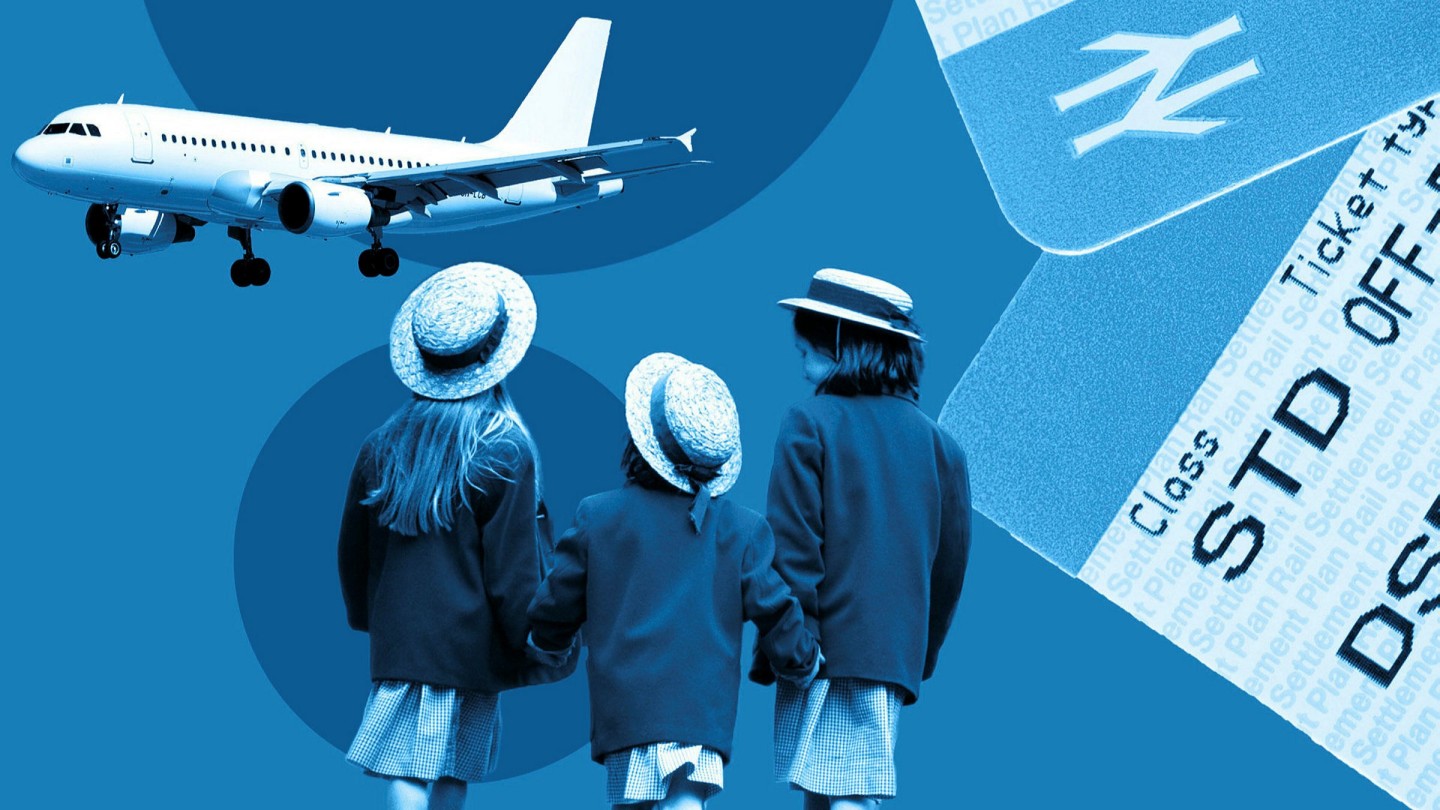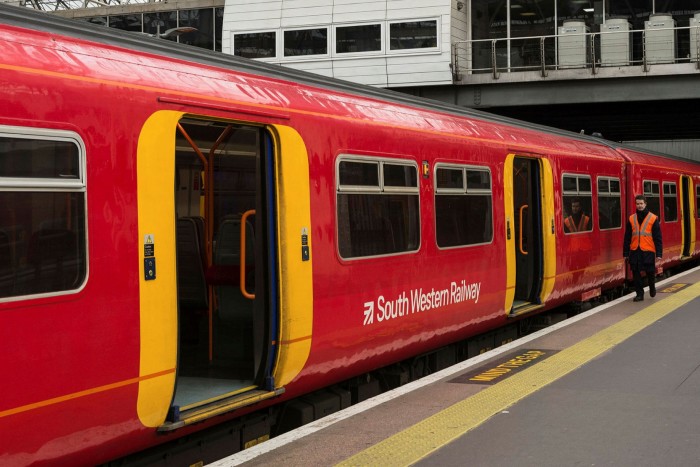How to get refunds for school fees, season tickets and much more

Roula Khalaf, Editor of the FT, selects her favourite stories in this weekly newsletter.
Coronavirus disruption has changed our day-to-day lives beyond all recognition. Millions of households face difficult choices about their personal finances as they seek to rebalance their budgets and manage the cash flow crunch.
Many will seek refunds on services they have committed to pay for, ranging from education to commuting costs and membership of gyms and clubs, which cannot be provided during the shutdown. Others are seeking refunds or insurance payouts on holidays and flights they had booked.
In such unprecedented times, it pays to know your consumer rights, but these must be weighed against warnings from smaller businesses that failure to pay for services could result in their financial collapse.
Private school fees
The final bell rang on Friday March 20, when the government announced it was closing schools to tackle the coronavirus pandemic. Experts say it is unlikely pupils will return before the end of the summer term and parents with children at fee-paying schools are asking whether they still have to pay.
Some 615,000 children attend independent schools in the UK, with annual fees as high as £45,000 for boarding schools and £25,000 a year for some London day schools.
Under normal circumstances, the next payment date would be for the summer term due at the end of the Easter holidays in April. So will they be expected to pay?
“This is a hugely difficult time for everyone,” says Julie Robinson, chief executive of the Independent Schools Council. “Schools are under immense pressures and this is one of the issues that will be dealt with at school level, depending on their individual policies and contracts with parents.
“We hope parents will bear with schools who need time to clarify government support measures and take stock of their situation and ongoing operations. They are focused on the welfare of their school communities and ensuring continuation of teaching and learning.
“Independent schools are fortunate to have access to effective online learning resources, enabling them to continue education remotely using technological solutions.”
Parents facing financial difficulties should contact their school as soon as possible, says Neil Roskilly, chief executive of the Independent Schools Association. All independent schools offer financial help to families, and while it is usually offered when a child enters a school, it can be extended to those families whose financial circumstances change.
Most private schools have funds available for this situation and can also defer fees if there is the prospect of future employment. This should be over a costed and reasonable timescale, usually is up to 12 months. Schools rarely charge interest.
To help bridge the gap between parental incomes and fees, more than £1bn a year is now provided in fee assistance to over 175,000 students, with about half allocated through means-testing.
“Schools are trying their best to maintain a ‘continuity of education’ via online technology and most parents we have spoken to understand that, and are choosing not to withhold fees,” says Mr Roskilly. “But in some cases, where schools have money in reserves, they are considering returning some of those fees to parents.”
Ellie Spencer, associate solicitor in the commercial dispute resolution team at law firm Goodman Derrick, says: “Parents are paying for a service and they might be able to argue that the school is not providing that service. Even if the school is providing online teaching, this is not the whole service, so parents might be entitled to a discount.”

Private nurseries
Parents of children at private nurseries in the UK can pay about £1,000 a month for 50 hours a week for a child under two, but in London, the average Ofsted-rated facility charges between £70 and £85 a day.
Parents typically pay monthly for nurseries so most are receiving bills for April now when children are already at home.
Nurseries are reacting to the closures in different ways. While some are charging full fees, others are offering discounts for all and some cutting costs specifically for families who have suffered a severe loss of income.
Nurseries have contracts with parents that are entered into when the child starts and the terms and conditions tend to require parents to give a month’s notice. They also usually require parents to continue paying fees during an emergency closure, but previously these have tended to be for a few days because of problems with the building.
Purnima Tanuku, chief executive of National Day Nurseries Association, says: “Whether parents continue to pay fees when a closure is outside of a nursery’s control will depend on the agreements between individual nurseries and their parents. We’re pushing the government hard to offer sufficient financial support so nursery businesses can remain sustainable.”
One parent with two children under five at nursery contacted FT Money to say: “I've just received my monthly £2,000 bill with no offer of a discount. It seems that parents — many of whom can now not go to work — are expected to keep the nurseries going without receiving a service.”
Lawyers say parents should negotiate. Edward Macey-Dare, a litigation and employment partner at Lee Bolton Monier-Williams, says: “Remember, nurseries are going to be under severe pressure as a result of the coronavirus situation and, if they play hardball, they are likely to face numerous parents giving notice to withdraw their children. It seems to me, therefore, that parents have the upper hand in this situation when it comes to negotiating a reduction in fees or more favourable payment terms.”
But others warn that without the financial support, private nurseries could collapse. “Some childminders and nurseries have asked parents to continue to pay their fees to retain their children’s places, even if they are not permitted to offer them childcare services,” says Lynne Rowland, a tax partner at Moore Kingston Smith.
“This is perhaps understandable in the absence of clarity over how the special financial measures apply. But the government should consider offering families full tax relief for these costs, which for many families are as essential as their mortgage or rent payments.”
The government has said that funding for early years entitlements covering up to 30 hours of childcare will continue during any periods of nursery closures. Some nurseries are encouraging key workers to continue sending their children into nursery so they can continue to access this government funding.

Rail season tickets
For many commuters the cost of their annual season ticket is their second biggest monthly bill after their mortgage. To get the best deal, many pay upfront for the year, possibly with an interest-free loan from their employers.
Train companies say annual season tickets will be refunded pro-rata, but to get any money back commuters must have 12 weeks remaining on them. This is because they effectively get 12 weeks of free travel on an annual season ticket. Monthly season tickets need at least six days remaining and weekly ones at least two days. The £10 administrative fee will be waived.
Someone who bought an annual season ticket for £4,980 at the beginning of the year should be able to get a refund for six months’ travel or £2,490. Refunds should be paid within 28 days. Full refunds can also be claimed for advance and off-peak tickets booked but not used — apply via train company websites.
Transport for London is slightly more generous. It requires six weeks to remain on annual season tickets, seven days on a monthly ticket and three days on a seven-day ticket, and does not charge an administrative fee. Apply for a refund via its website.
Many commuters pay to guarantee a place in their station car park by buying an annual season ticket. A typical permit costs over £1,000. Apply online for refunds to the company that runs the car park.

Sports subscriptions
With no live football likely until June at the earliest and many other major sporting events cancelled or postponed, subscribers to Sky Sports can pause their sports subscription online and it will automatically resume when live football and other major sporting events return.
A message on Sky’s website reads: “While we expect that many of the recently postponed sports events will eventually go ahead, if you wish to pause your sports subscription in the meantime you will not be charged a fee to do so or be held to any notice period.”
Get in touch with the FT Money team
Are you struggling with a financial issue, or want to know what your consumer rights are on these, and other subjects? We encourage readers to contact us, in confidence, with questions about the financial issues they are facing as a result of the coronavirus to help inform our future coverage. Please email us: money@ft.com
BT Sport says that customers on its new “flexible TV” package can pause their subscription and make other changes by logging on to bt.com/tv.
BT says: “For now, we have been busy working on a revised schedule for BT Sport which will include variations of popular shows such as Premier League Tonight, live WWE, Rugby Tonight, BT Sport Films and ESPN Films, recent boxing events and classic football, rugby and other sport fixtures from across the years.
“We understand that this is a difficult time for customers and if they wish to discuss their BT Sport contract or other options, would ask they give us a call.”
When it comes to live sporting events, season ticket holders should check the terms and conditions of their clubs. Tickets for postponed games are usually valid when the game is finally played.
For example, Arsenal’s terms and conditions read: “The club reserves the right to reschedule any match or, if necessary, play the match out of view of the public, without notice and without any liability whatsoever.”
Manchester United’s say: “Where any match is cancelled, abandoned or postponed the club shall have no liability whatsoever to ticket holders,” although ticket holders would be entitled to attend rearranged matches.
Live events
People who had secured Glastonbury tickets have been told that their £50 deposits will be rolled over to next year, after this year’s festival was cancelled.
People with tickets for shows and gigs that have been postponed may find they can only get refunds if they cannot attend the new date. For example, tickets for Trevor Noah at the O2 centre at the beginning of April can be used at the rescheduled shows in September.

Gym membership
Gym members who may have found it difficult to end membership contracts in the past could find that their fees stop automatically.
Virgin Active is automatically freezing all memberships at its clubs with no fees to pay until they reopen. It is crediting members with any fees that have already been paid for April and will also credit for March 21 to 31. Its social channels @VirginActiveUK remain open with advice on workouts to do at home.
Gymbox says that for as long as its clubs are closed there will be a freeze on monthly memberships. No payments will be taken for April and any future months it is closed, and fees for time lost in March will also be credited.
Competition in the gym market means many clubs charge on a month-to-month basis, but fixed memberships could prove trickier to cancel — check the terms of your contract to see if a percentage of your fees could be refunded.
University costs
The Student Loans Company says that university students will still receive their loans for living costs at the beginning of the summer term as scheduled, and their tuition fees will be paid directly — regardless of whether their university or provider has made alternative arrangements for teaching.
Universities UK says that while it understands that missed teaching time was “unsettling” for students, universities moving teaching online “does not amount to a closure”. However, many students will have left their campus and student accommodation and returned home to their parents.
This week, Unite, the UK’s largest student accommodation provider, said it would allow students to leave their tenancies early. They will not have to pay their rent for the final term if they tell Unite that they have left or are leaving by 5pm on April 10.
Unite charges an average weekly rent for en suite accommodation of £138 outside London and £221 in the capital.
Unite says: “We are also very conscious that some students may need to extend their stay with us, for example, international students who may not be able to return home due to travel restrictions or those estranged from family without the traditional support network in place. For these students, we will do everything we can to support them beyond their tenancy period at no extra charge.”
University-owned halls of residence may be more willing to issue a partial refund if students have moved out, but private student landlords are less likely to offer any leniency. Many parents will be obliged to keep paying if they offered to act as rental guarantors.

Flights and holidays
If your flight or package holiday was scheduled before April 16 and is cancelled, you do not have to accept a voucher or credit note or be forced to rebook. You are legally entitled to a refund.
The advice not to travel abroad from the Foreign and Commonwealth Office (FCO) also means you should be able to claim from your travel insurer for consequential losses, such as booked hotel rooms or car hire.
When flights and holidays are cancelled, airlines and travel agents are obliged to issue refunds or allow you to rebook for a future date. Under the Package Holiday and Linked Travel Regulations 2018, holidaymakers are also due a full refund.
However, consumer group Which? has found that many companies are ignoring this requirement and are only offering consumers credit vouchers or the chance to reschedule.
Martyn James of Resolver, a free online complaints company, says: “If the hotel, holiday pr flight has been cancelled then you should get a refund as it’s not you, it’s them.”
If firms insist on providing vouchers instead of refunding, he says: “Ask the firm to send you the terms and conditions where it says they can do this. If you don’t think it’s fair, make a complaint.”
British Airways says it will rebook or refund for tickets under its “Manage My Booking” facility. Ryanair has removed its flight change fees on all bookings next month.
Airlines are experiencing an extremely high volume of calls. BA, easyJet, Ryanair and Virgin Atlantic are asking that only passengers who were due to travel in the next 72 hours call or message, so they can help those needing urgent rebooking.
Most travel insurers will ask you to seek a refund from the travel firm first, but if your policy covers you for cancellation, then you can make a claim.
Airbnb says that reservations for stays and experiences made on or before March 14 with a check-in date between then and April 14 will be eligible for a full refund. If a hotel has closed, you are also due a full refund.
If airlines or holiday companies will not pay for cancelled flights or holidays, those who paid by credit card should be able to get compensation under Section 75 of the Consumer Credit Act. But if the hotel is still able to offer the accommodation you are unlikely to get a refund because the provider has not broken their agreement with you.
For bookings after April 16, the situation is less clear. Holidaymakers will have to wait to find out if their flights are affected and what the FCO advice is on travel at that time.
Private members’ clubs

The coronavirus crisis has divided London’s members’ clubs, the watering holes of well-off and well-connected people ready to fork out £1,500 a year or more for the privilege of eating and drinking with others like themselves, writes Stefan Wagstyl.
After shutting their doors last week when the government ordered bars and restaurants to close, club managers have been wondering how to keep their members on board — and, crucially, stop them cancelling their subscriptions.
More modern establishments such as Soho House, founded in 1995, have risen to the challenge with credit vouchers and offers of online talks and virtual wine tastings.
But an old guard headed by the likes of the Athenaeum Club, set up in 1824, have opted to batten down the hatches, and appeal instead to their members’ loyalty and collective stiff upper lip.
As the Athenaeum told members in a recent mailing: “We do not plan to offer any reimbursement of subscriptions, but to use the funds we have to ensure that when the current situation is resolved we can reopen from a position of financial security.”
Even when times were good, many older clubs struggled to generate enough cash to cover the costs of running their staff as well as maintaining grand buildings, mostly in the historic St James’s district. The crisis has now hit finances hard.
The Royal Automobile Club, established in 1897 and standing on Pall Mall, a few doors from the Athenaeum, warned members even before the government closure orders not to expect refunds from annual subscriptions of up to £1,829.
In a note to members, chairman Ben Cussons wrote: “We have not taken this decision lightly, but it is in the best interests of our members to ensure that the Club emerges from this challenging period in a strong position, so that we are best able to serve members’ future needs.”
But Soho House, one of the best-known of a new crop of clubs set up in the past 25 years as trendy alternatives to the old guard, is taking a quite different approach. It is offering members credits for the pro-rata value of their membership during the coming closure.
After reopening, the money can be spent on food, drink, spa treatments or bedrooms (the club has accommodation in central London, in the rural Cotswolds and cities around the world). With annual subscriptions of up to £1,750, that could quickly amount to a serious amount of champagne.
A big difference between Soho House and its older rivals is that it is a business owned by shareholders, who make key decisions.
By contrast, the traditional clubs, including the Athenaeum and the RAC, as well as other august names such as the Reform Club and White’s are controlled by members. With thousands of stakeholders, responding quickly to a crisis is difficult.
David Wynne-Morgan, chairman of 5 Hertford Street, a new generation, shareholder-owned club which opened in 2012, says: “Some of the traditional clubs were in difficulties even before the current crisis. They are in a different ball game from us and sometimes they are inclined to be a bit old-fashioned.”
But members believe the traditional clubs can weather the crisis, having survived turmoil from before the Napoleonic Wars. They believe their establishments have unique charms. As violinist Yehudi Menuhin once wrote: “The wonderful thing about the Athenaeum is the setting it offers for productive leisure: the spaces between duties, the borderlines between people.”
Comments